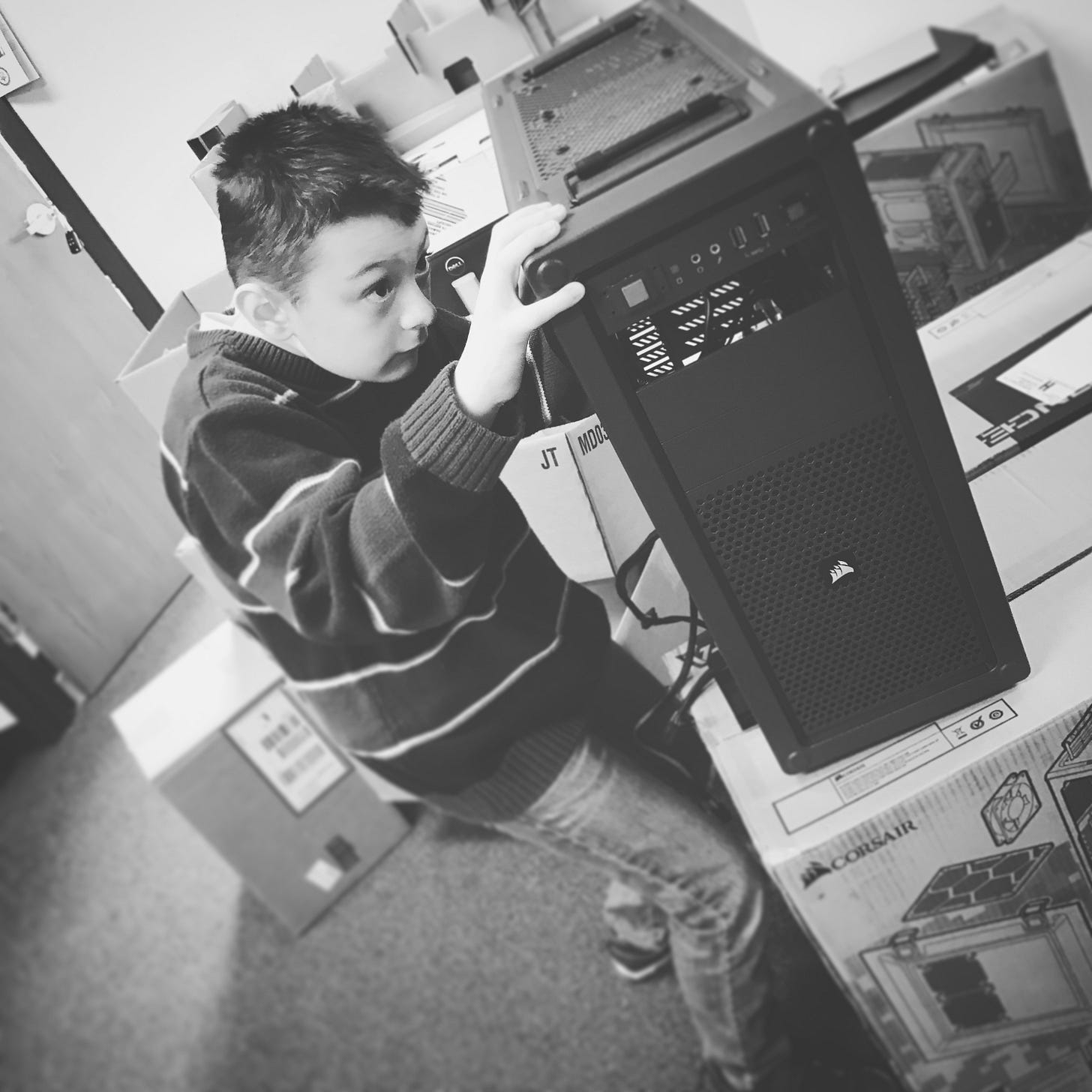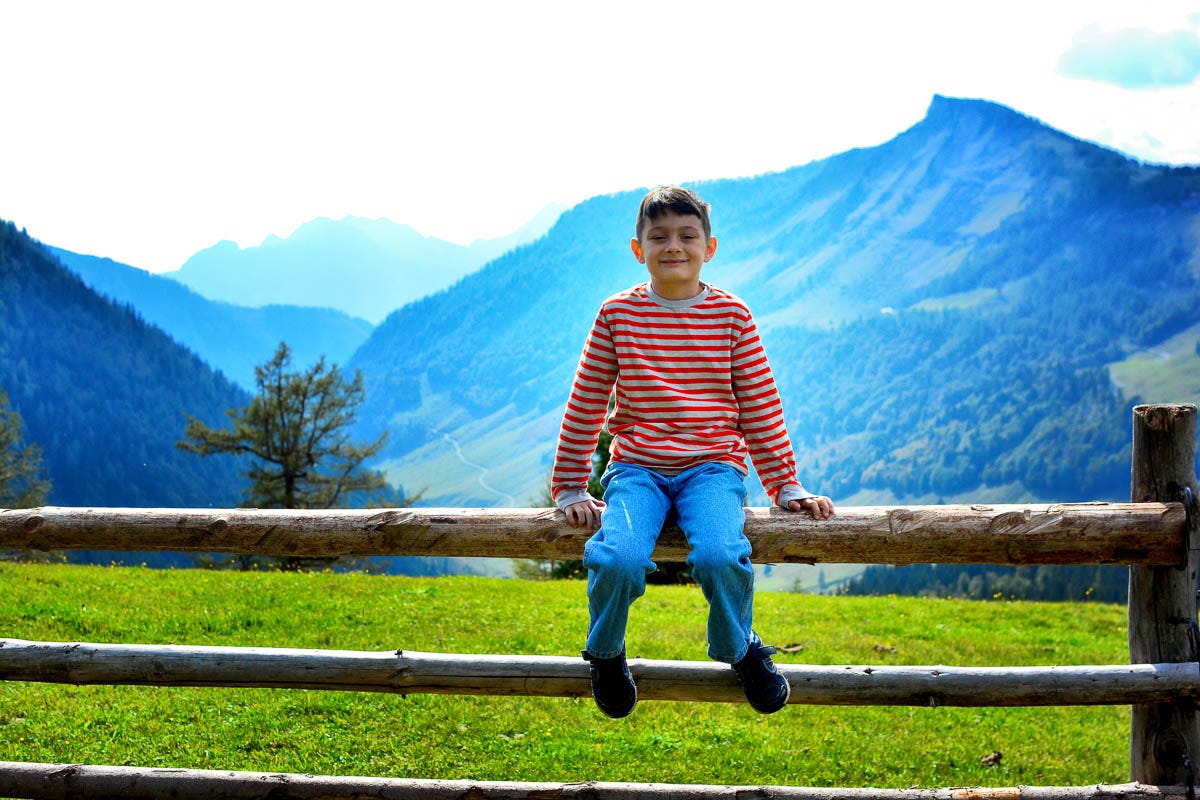Author’s Note:
This is a story about fatherhood, recovery, and the quiet, often unseen work of healing relationships. It’s about showing up, even when you’re not sure it matters—and what happens when, one morning, it suddenly does.
If this story resonates with you, please considering sharing it with others.
The Invitation
I woke to the soft, staccato calls of chickadees flitting through the Bradford pear tree outside my window. Their rhythmic chirps signaled my body that dawn had arrived. A gentle light framed the drawn curtains, casting pale golden squares against the shadows of my room.
Before I could stir, a quiet knock at my bedroom door cut through the hush. My spouse and the dog were still sound asleep. I rose quickly, careful not to disturb them, already anticipating what I might find on the other side. A sick child, most likely—perhaps a fever, a headache, or some new ailment requiring immediate triage. My mind was already assembling a plan of action as I reached for the doorknob and cracked the door open.
Instead of my daughter, I found the tall, lanky frame of my 17-year-old son standing in the dim hallway, still in his pajamas.
“Hi, buddy,” I whispered through sleep-heavy eyes. “What’s going on?”
“You need to look outside. Right now.” His voice was hushed but insistent, his expression serious—not anxious, not afraid, just… certain.
I blinked, confused. “What?”
“Look outside,” he repeated, gesturing toward his bedroom.
For the first time in years, I stepped into my son’s room at his invitation. His Star Wars bedspread was rumpled, the clean laundry I had folded the night before lay in a heap on the floor. Stacks of books lined the shelves, arranged not with order but with purpose, cairns marking the waypoints of his intellectual journeys. His curtains were still drawn over the paned windows that faced south.
What awaited me beyond them? Had the sprinkler system burst in the night? Had a tree fallen on the shed again? Was something on fire? I pulled back the curtains, bracing myself.
Instead, I was met with the breathtaking expanse of a sunrise in full bloom.
The leafless branches of the forest stood like ink strokes against the sky, silhouetted against waves of luminous pink, fiery orange, and delicate rose. The clouds undulated across the horizon in dizzying patterns, each one capturing the light like shifting embers. A golden glow flooded the room, soft and warm. In the garden below, a lone deer grazed among the empty beds, its slender legs moving with quiet grace. Its short white tail flicked back and forth, as if waving to a familiar neighbor.
I turned to my son, searching for an explanation.
“You wanted me to see the sunrise?” I asked, hesitating.
“Yeah.” He flopped onto his bed, stretching his arms behind his head, staring at the ceiling with a look of pure contentment. “It’s amazing, don’t you think?”
It is amazing. Don’t I think?
The Distance Between Us
For a long time, my son was my shadow, my closest companion. He was so eager to be with me that the most treasured gift he ever received was a homemade coupon that read A Day with Dad. He kept it on his nightstand for years. As a toddler, he would wait for me in the driveway when I came home, running to my motorcycle the moment it stopped so he could turn off the key. I would hoist him up onto the bike, and he would chatter endlessly about his day. He lived for those moments—for wearing my helmet, my boots, for slipping his small hand into mine as we walked through a store. At night, he would curl up on my lap with a book, his little voice animated as he explained the characters to me.
When I was in graduate school, he and I built an entire research lab full of computers together, assembling them from scratch—just the two of us. I had never seen anyone so thrilled to plug in motherboards and hard drives. He spoke of that day with enthusiasm for years to come, telling his friends of the day he built four computers with his dad at Indiana University. It was an incredible bonding experience for us both.
But at some point, around the time my son turned 16, things changed. The laughter dimmed. The open affection disappeared. His bright, eager eyes became shuttered, wary. Where he had once sought me out, he now avoided me. Conversations that used to flow effortlessly became labored, then sparse, then nonexistent. My questions about his day were met with one-word replies or silence. He began slipping out of rooms the moment I entered, as if even proximity was too much to bear. The harder I tried to bridge the widening chasm, the deeper it seemed to grow.
I want to tell myself that this is just normal teenage distance, that all kids eventually pull away, that it’s part of growing up. And maybe that’s true. Maybe he would have drifted away regardless. But I also know the truth—the harder truth—that I was the one who moved first. I was the one who pulled away long before he did, even if I didn’t realize it at the time.
There was a period of my life when I was drowning in my own misery, except I didn’t call it that. I called it stress. I called it exhaustion. I called it the natural consequence of climbing the ladder and earning my keep; proving myself and carving out my little section in this world; beating out the competition. And I had loads of excuses to pardon my negativity. If you had my past, if you had to carry what I carried, you would drink too, so get off my back! I told myself that more times than I can count. And I drank, convinced that I was owed something—relief, escape, a numbing agent for the unbearable weight of my own mind.
Alcohol turned me into a man who thought only of himself. I was never the kind of drunk who got mean or violent. I was just… absent. Even when I was physically present, I was somewhere else—thinking about my own problems, wrapped up in my own struggles, wallowing in my own perceived injustices. And I carried a bitterness with me, an undercurrent of resentment, as if the world had conspired against me in some grand, cruel joke. I could be sharp and impatient. I could be dismissive. And as much as I tried to be a good father, I know now that I fell short of the mark more times than I want to admit.
I don’t think my son would ever say outright that my drinking damaged him, but I see it in the way he holds himself, in the way he keeps his distance. I see it in the way he assumes, even now, that I will disappoint him. The deepest wounds aren’t always from what was done, but from what wasn’t. I see now that my absence in those critical years left gaps in him—gaps that, at the time, he probably thought were his fault.
When I first got sober, I carried that guilt like a millstone around my neck. Some people’s recovery stories involve paying off huge debts or serving out prison sentences. My wreckage was relationships, and I thought that if I just worked hard enough—if I apologized the right way, if I proved myself, if I showed up day after day and did everything right—then I could fix things. But I have learned that relationships don’t work that way. I can’t undo years of hurt with a few months (or years) of effort. They don’t get fixed. They heal. And healing takes time—always more time than I want it to.
I remember talking about this in a meeting once, lamenting how much damage I had done, how my son’s negativity was a direct result of my past failures. An old-timer approached me after the meeting. He looked at me, chuckled and shook his head.
“There you go, making it all about you again.”
I appreciated the gentle reminder of how easily I can think of myself and see things from a self-centered perspective. But his message was also a gentle reminder to go easy on myself. Sometimes teenagers are just plain grumpy for no good reason. Teenagers are self-centered by nature, and nothing is more appealing to them than the armor of victimhood. I’ve spent too much time trying to carry the blame for both of us, as if my guilt alone could bridge the gap. That’s not how this works. I can’t control when—or if—my son decides to let me back in. I can’t force him to see me differently. I can’t undo the past.
All I can do is be steady. Be present. Be consistent.
Which, for a man like me, is like saying all I have to do is fly, and breathe underwater!
Relationships Are Marathons, Not Sprints
This past year has been the darkest of our relationship. I have grieved his absence like the death of a loved one, moving through denial, anger, and despair. I have struggled to love him well, even when his words and actions have cut deep. I have continued to reach for him, even when I am met with nothing. I tell him I love you even when the only response is an indifferent nod. I touch his shoulder in passing, hoping that some part of him still recognizes my presence as steady and unshaken. I ask about his day, his interests—robotics, film club, Dungeons & Dragons—anything to draw him out. But most days, all I receive in return is silence.
I have never known rejection like this.
Some days, I tell myself this is my burden to bear—the price of past mistakes, the consequence of choices I can never take back. Other times, I remind myself that relationships have seasons, and this one, too, will shift in its own time. I try to weather the storm of his indifference. I choose my words carefully, deliberately, reminding myself that this is the long game. This is what fatherhood is.
It is about being here.
So I show up—because I know what it feels like when a father doesn’t. My own father was a ghost in my childhood, an infrequent presence who only came to town to acknowledge my successes but was never there to walk beside me through the hard times. He made it clear—whether through action or inaction—that I was not worth sticking around for. And for years, I carried that truth like a wound that never quite closed, like a whisper at the back of my mind telling me I was unworthy of love.
I refuse to pass that kind of pain to my son.
So even when he pushes me away, when his words are sharp and his silence sharper, when the weight of his rejection threatens to sink me, I show up.
And maybe, just maybe, it is working.
I can go days without getting more than a grumpy okay from him…
And yet, this morning, my son woke up, saw something beautiful, and chose to share it with me.
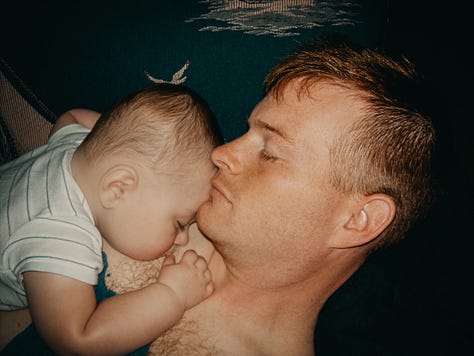
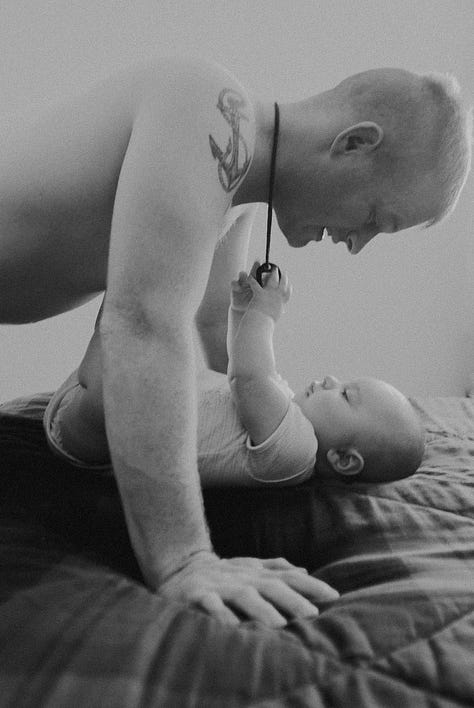
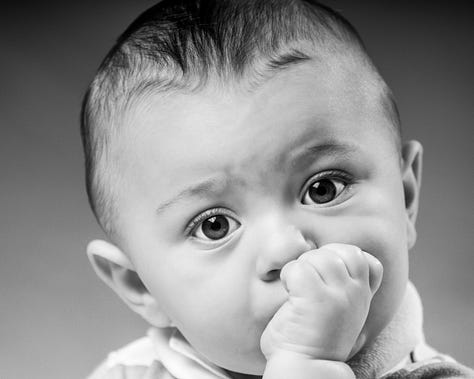
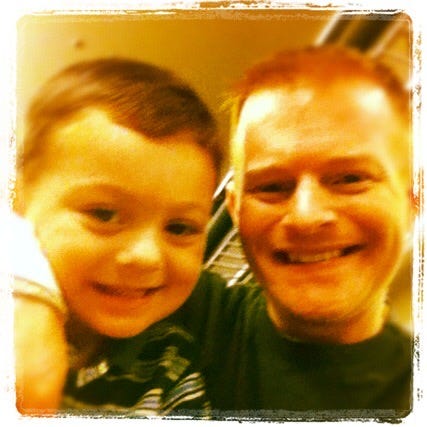
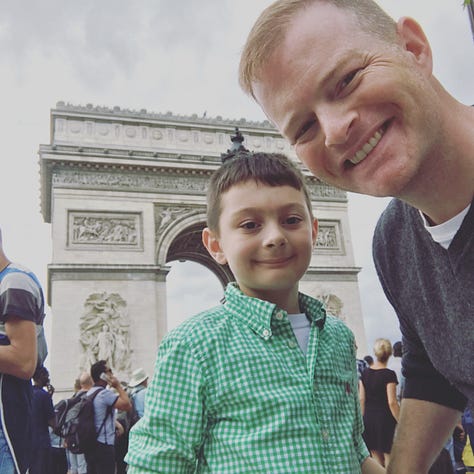
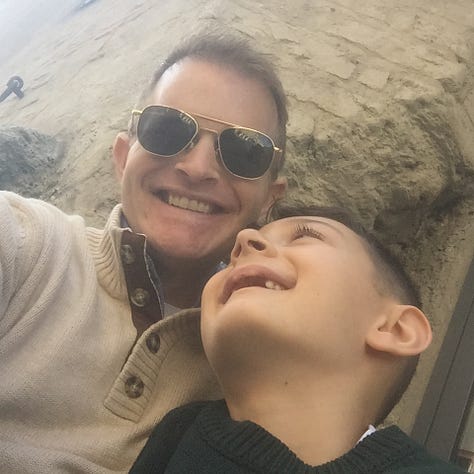
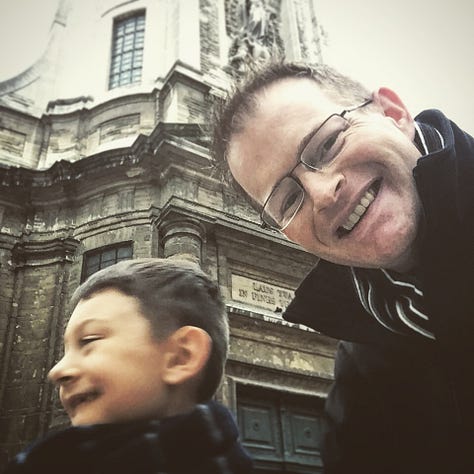
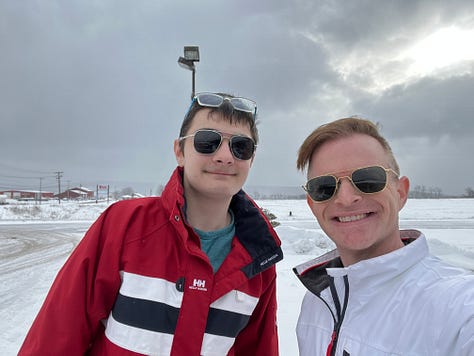
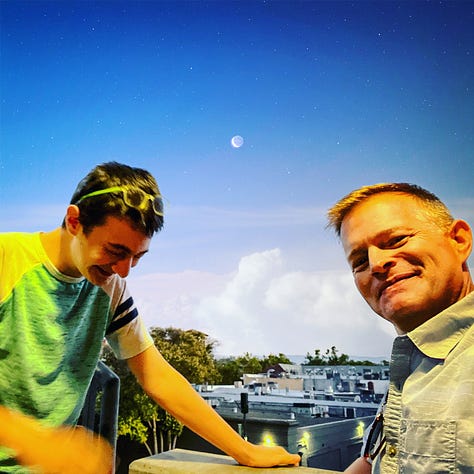
I turned back to the window, this time seeing the sunrise for what it truly was—a miracle.
I stood motionless, letting its warmth bathe my skin, my eyes blurring with unexpected tears. My lips quivered as I tried to speak, and I had to swallow against the lump rising in my throat. I whispered a silent prayer of gratitude—for the sky painted just for me, for this moment of quiet peace, for the brief, unexpected grace of my son’s invitation. A gesture of reassurance. A sliver of light breaking through the clouds.
A pause in the storm.
A breath of hope.
Finally, I found my voice.
“Yes,” I whispered, more to myself than to him. “It is amazing.”
About the Author
E.S. Vorm, PhD is a veteran of the war in Iraq and PhD scientist who spent two decades chasing excellence—driven by an unrelenting need to prove his worth. After reaching the end of himself, he began the slow work of healing. Now a full-time homeschooling dad, he writes about recovery, fatherhood, and the quiet, sacred beauty of a life no longer lived in pursuit.






